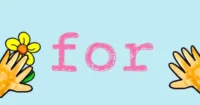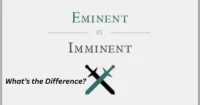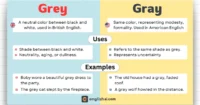How to Use the Word “For” – Easy Guide with Examples
Published: 6 Jul 2025
One small word, endless possibilities — welcome to the world of “for.”
At first glance, for might seem like just another tiny preposition, but don’t be fooled! This short word works hard behind the scenes to connect ideas, show purpose, express emotion, and even reveal direction.
Whether you’re learning English or polishing your grammar, understanding how to use for correctly can transform the way you speak and write. In this article, we’ll break down the many meanings and uses of for — with real-life examples that make learning fun and simple.
Let’s dive in and discover why for is more powerful than it looks!
📚 What Is “For”? — A Quick Definition
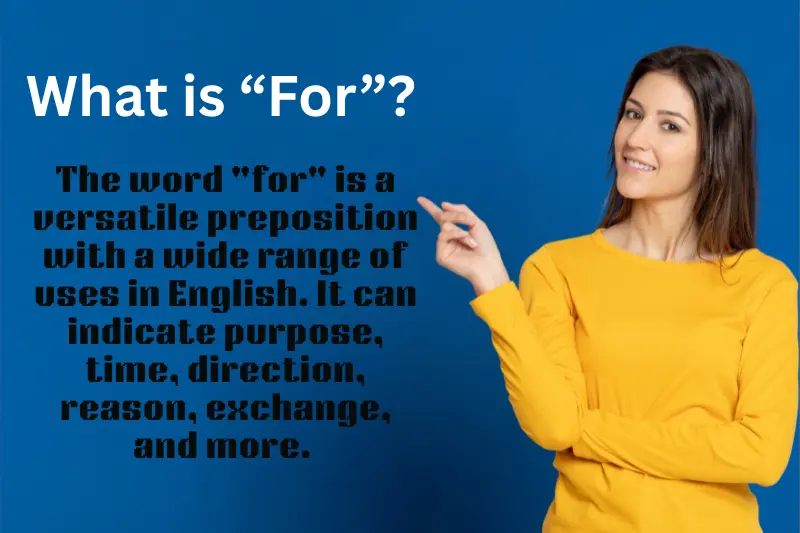
“For” is one of the most commonly used words in English, yet it carries a surprising amount of meaning depending on how it’s used. At its core, for is a preposition — a word that links other words to show relationships like purpose, benefit, duration, exchange, and more.
But that’s not all.
In certain contexts, for can also function as a conjunction (meaning “because”) or even appear as a prefix in words like forbid and forsake, where it adds a negative or intense meaning.
So whether you’re talking about doing something for fun, buying a gift for someone, or feeling happy for a friend — this small word does a big job.
🧭 Most Common Uses of For
The word “for” appears in conversations, signs, books, and even your morning coffee order — but its meaning changes based on how it’s used. Let’s explore the most common (and useful!) ways to use for in English.
🎯 a. Purpose or Intention
“This lotion is for dry skin.”
When you want to explain why something exists or what it’s meant to do, for is your go-to word. It introduces purpose, reason, or function.
Examples:
- A bag for travel
- A gym for working out
- Vitamins for stronger bones
👤 b. Recipient or Beneficiary
“This gift is for you.”
Use for to show who receives something or who benefits from an action. It connects the action to the person it’s meant to help.
Examples:
- I wrote a poem for my mom.
- Can you carry this for me?
- A chair for guests
🧳 c. Destination or Direction
“He left for London at noon.”
When someone or something is going somewhere, for shows the intended destination.
Examples:
- The bus leaves for Karachi.
- Are you heading for the beach?
- She started packing for her trip.
💰 d. Exchange or Price
“Three shirts for $20.”
Use for when you’re talking about trading, buying, or selling things. It introduces the value or exchange.
Examples:
- Paid $50 for groceries
- Traded his phone for a new one
- A deal for less than expected
🕒 e. Time or Duration
“We waited for two hours.”
For tells us how long something lasts or continues.
Examples:
- Stayed awake for a week
- Vacationed for a month
- Studied for the whole evening
🔁 f. Substitution or Help
“Can you speak for me?”
Sometimes for is used to show who someone is helping or replacing.
Examples:
- I’ll answer the call for him.
- She baked cookies for her team.
- Fill this out for your brother.
😃 g. Emotion or Support
“I feel sorry for her.”
When you’re expressing feelings about someone or something, for often appears.
Examples:
- Happy for you!
- I care deeply for him.
- Proud for our team’s win
🧠 h. Reason or Cause
“He was fined for speeding.”
This use explains why something happened — the cause of an action or event.
Examples:
- Apologized for being late
- Got a prize for winning the race
- Punished for breaking the rule
✨ Less Obvious But Powerful Uses of For
While many uses of “for” are easy to spot, others are more subtle — yet just as important. These lesser-known meanings can add depth, emotion, and precision to your English.
Let’s explore these hidden gems:
🧩 a. Suitability or Preference
“That movie is too scary for kids.”
Here, for shows whether something is appropriate or suitable for someone or something.
Examples:
- This room is perfect for meetings.
- Too tight for me to wear
- Heavy for its size
🔄 b. In Place Of / On Behalf Of
“Can you sign this for your sister?”
For is often used when someone does something in place of another or acts on their behalf.
Examples:
- I spoke for the whole group.
- He filled out the form for his dad.
- They voted for the team captain.
😲 c. Surprising Comparison
“She’s very mature for her age.”
This use highlights something unexpected or unusual, comparing it to what’s normal.
Examples:
- He’s quick for a beginner.
- Small for a truck
- Too clever for his own good
💘 d. Desires, Emotions, and Tastes
“She has a love for poetry.”
For connects feelings, tastes, or desires to their objects. It shows what someone cares about or is drawn to.
Examples:
- A passion for painting
- Longing for peace
- An ear for music
🧠 e. Perspective or Attitude
“For him, success means freedom.”
Sometimes, for shows how something is viewed, felt, or experienced by someone.
Examples:
- For most students, exams are stressful.
- For her, home means family.
- For me, it’s not worth the risk.
🚫 f. In Spite Of / Contrast
“He’s kind, for all his grumpiness.”
This literary use of for means even though or despite something.
Examples:
- For all her fame, she remained humble.
- He’s strong for his age, but still fragile.
- A good man for all that
📊 g. Ratio or Attempt
“She went 3 for 5 in the game.”
Used especially in sports and statistics, for can show success rate or ratio.
Examples:
- Scored 2 for 4
- 1 win for every 3 tries
- One ticket for each person
🔗 “For” as a Conjunction
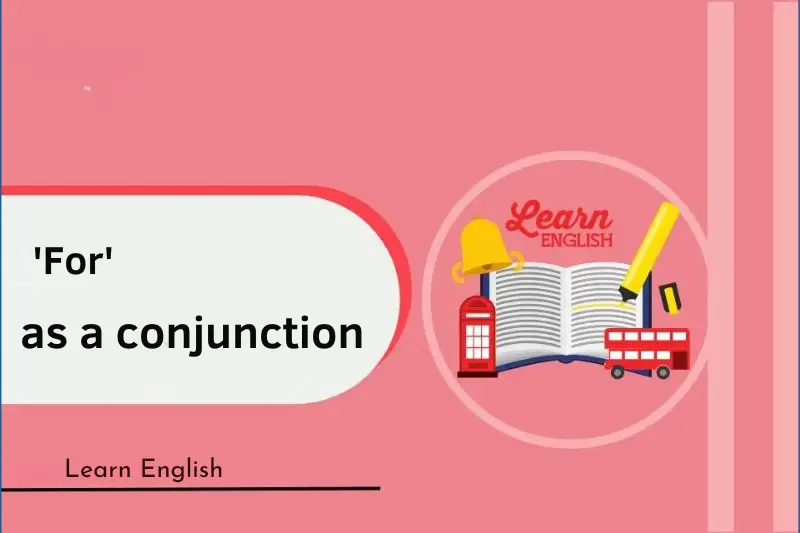
While for is mostly used as a preposition, it can also act as a conjunction — a word that connects two clauses. In this role, for has a meaning similar to “because” or “since,” and it often appears in more formal, literary, or poetic writing.
📝 What Does It Do?
When used as a conjunction, for introduces a reason or explanation for what was said in the first part of the sentence.
“He stayed indoors, for it was raining.”
(Translation: He stayed indoors because it was raining.)
📚 Examples in Sentences:
- She left early, for she wasn’t feeling well.
- We need to hurry, for the store is about to close.
- He was loved by all, for he was kind and generous.
💡 Note for Learners:
- This use of for is not common in casual conversation.
- It is mostly found in books, speeches, and older or more formal styles of writing.
- In everyday speech, people usually say because or since instead.
✅ Quick Tip:
If you can replace for with because in the sentence and it still makes sense — you’re likely dealing with conjunction for.
“I didn’t eat it, for I wasn’t hungry.”
= “I didn’t eat it, because I wasn’t hungry.”
🚀 “For” in Phrasal Verbs and Expressions
Beyond being a preposition or conjunction, for often teams up with verbs to create phrasal verbs and idiomatic expressions that add color, clarity, and rhythm to everyday English.
These combinations are powerful tools for expressing actions, feelings, and abstract ideas with precision.
🔄 Common Phrasal Verbs with For
Here are some widely used phrasal verbs that include for:
| Phrasal Verb | Meaning | Example |
| Account for | Explain or justify something | He couldn’t account for his absence. |
| Look for | Try to find something | I’m looking for my keys. |
| Go for | Try to achieve or choose something | She decided to go for the job. |
| Stand for | Represent or symbolize something | NASA stands for National Aeronautics and Space Administration. |
| Make up for | Compensate for something | I’ll make up for being late. |
| Care for | Take care of or have affection for | He cares deeply for his pets. |
| Wish for | Desire or hope for something | She wished for better days. |
💬 Common Expressions with For
For also appears in many expressions and idioms that English speakers use daily:
- “For good” – permanently
Example: He moved to Canada for good. - “For real” – genuine or serious
Example: Is this offer for real? - “For the record” – officially stated
Example: For the record, I never agreed to that. - “For the sake of” – in the interest of
Example: Let’s do it for the sake of peace. - “For now” – temporarily
Example: This will do for now. - “For the time being” – until something changes
Example: We’re closed for the time being.
🌀 Prefix “for-”: The Forgotten Side
When most people think of for, they think of a simple preposition. But there’s another, lesser-known role it plays — as a prefix. Though no longer widely used in modern word formation, the prefix for- appears in many older or more formal English words and adds a powerful twist to their meanings.
Let’s uncover this forgotten side of for.
🔍 What Does the Prefix for- Mean?
As a prefix, for- adds one of the following meanings to a word:
- 🚫 Negation or prohibition — something not allowed or deliberately avoided
- 💥 Destruction, intensity, or ruin — something done completely, excessively, or to a harmful degree
- ❌ Rejection or denial — refusal or resistance
🧾 Common Words with the Prefix for-
| Word | Meaning | Example Sentence |
| Forbid | To command someone not to do something | Smoking is strictly forbidden here. |
| Forsake | To abandon or give up | He vowed never to forsake his duties. |
| Forgo | To do without something (voluntarily) | She decided to forgo dessert tonight. |
| Forlorn | Feeling abandoned or hopeless | The dog looked forlorn in the rain. |
| Forswear | To formally reject or give up a belief or habit | He forswore all violence. |
| Fordo | To destroy or undo (now archaic) | The villain’s greed fordid him. |
🧠 Quick Tips to Remember For Usage
With so many meanings and uses, for might seem overwhelming at first — but don’t worry! These quick and simple tips will help you understand and remember how to use for like a pro.
✅ Tip 1: Use for to Show Purpose
If you’re saying why something exists or is done, for is probably the word you need.
“This pen is for writing.”
Think: What is this used for?
✅ Tip 2: Use for When Someone Gets Something
Whenever someone receives or benefits, use for.
“I bought a gift for you.”
✅ Tip 3: Use for with Time and Duration
If you’re talking about how long something lasts, go with for.
“She studied for three hours.”
✅ Tip 4: Use for to Show Support or Representation
When you’re on someone’s side or speaking for them, use for.
“I’m all for the idea.”
“He spoke for the team.”
✅ Tip 5: Replace “Because” with For (in Formal Writing)
If the sentence is formal or literary, try using for instead of because.
“They stayed home, for it was raining.”
✅ Tip 6: Learn Common Phrases with For
Expressions like for real, for sure, and for the record are everyday phrases that make your speech sound natural and fluent.
🧠 Bonus Trick:
Whenever you’re unsure, ask yourself:
“Is this showing a reason, goal, benefit, time, or replacement?”
If yes — for might be the perfect fit!
❓ Fun Practice: Guess the Meaning of “For”
Let’s make learning fun! Below are example sentences where for is used. Your challenge? Guess what function for is playing — is it showing purpose, duration, benefit, reason, exchange, or something else?
🔍 Example 1:
“She waited for the bus.”
👉 What does for express here?
✅ Answer: Purpose or direction — she is waiting in order to catch the bus.
🔍 Example 2:
“He worked there for three years.”
👉 What’s the use of for?
✅ Answer: Duration — showing how long the action lasted.
🔍 Example 3:
“This gift is for you.”
👉 What role does for play here?
✅ Answer: Recipient — showing who the gift is intended for.
🔍 Example 4:
“He apologized for the mistake.”
👉 What does for mean here?
✅ Answer: Reason or cause — explaining why he apologized.
🔍 Example 5:
“They sold it for $10.”
👉 What’s the meaning of for here?
✅ Answer: Exchange or value — indicating the price.
❓ Frequently Asked Questions (FAQs)
A: For is mostly a preposition, but it can also be a conjunction (meaning “because”) and sometimes appears as a prefix in words like forbid or forsake.
A: Good question! For shows purpose, benefit, or reason (e.g., This gift is for you), while to usually shows direction or movement (e.g., Give this to her).
Both can be used when someone receives something, but they’re not always interchangeable.
A: Yes, especially when it’s used as a conjunction in formal writing. Example: “For he knew the truth, he stayed silent.”
But in casual speech, it’s more natural to use “because.”
A: Some popular ones include:
For sure (definitely)
For now (temporarily)
For real (seriously)
For example (to give an example)
For the sake of (in the interest of)
A: Look at the context. Ask yourself:
- Is it showing time? → for two hours
- Is it showing who gets something? → for you
- Is it showing purpose or reason? → for winning
The sentence will guide you!
🔚 Conclusion
The word “for” may be small, but it plays a big role in English. From showing purpose and time to expressing emotions and making comparisons, for is everywhere! Once you understand its different meanings, you’ll start to use it more naturally in your speaking and writing. Keep practicing, and for will soon feel easy and familiar.

- Be Respectful
- Stay Relevant
- Stay Positive
- True Feedback
- Encourage Discussion
- Avoid Spamming
- No Fake News
- Don't Copy-Paste
- No Personal Attacks



- Be Respectful
- Stay Relevant
- Stay Positive
- True Feedback
- Encourage Discussion
- Avoid Spamming
- No Fake News
- Don't Copy-Paste
- No Personal Attacks


